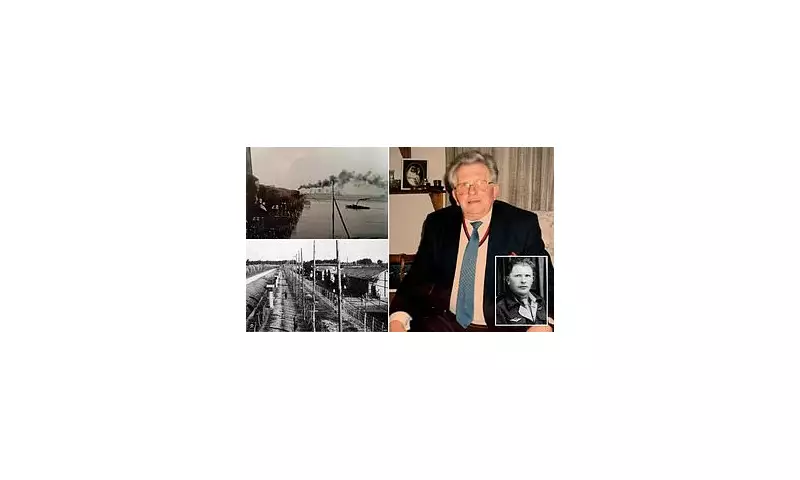
To his colleagues at the Dunlop rubber factory in Dumfries, he was simply Lucien - a capable foreman going about his daily work. To fellow anglers along the River Nith, he was a passionate fisherman who loved nothing more than catching trout. But this unassuming man harboured an extraordinary secret from his past.
The Modest Hero with a Secret Past
Wladislas Cieslak, who adopted the French name Lucien that he would use throughout his life, was actually a decorated SAS veteran who played a crucial role in one of the Second World War's most daring missions. His incredible story is now revealed in a new book by historian and filmmaker Damien Lewis.
Born in Poland, Cieslak ran away from home at just 18 to join the French Foreign Legion. Standing five foot seven inches but powerfully built, he quickly proved his military prowess. Early in the war, he earned the Croix de Guerre medal for destroying German tanks advancing toward a French village.
His wartime experiences read like an adventure novel: captured and held in dreadful conditions at a POW camp in Dusseldorf, he managed to escape and embarked on an epic journey across Nazi Germany. This perilous trek involved hiding in graveyards, swimming across the winter-chilled River Rhine, and even clinging to the underside of a train to avoid recapture.
The Audacious Train Hijack Mission
By autumn 1943, with Allied forces including the SAS landing at Taranto in Italy, intelligence emerged about a brutal internment camp in Pisticci. Established in 1939 by Italian leader Benito Mussolini, the camp with its watchtowers and barbed wire held Jews, partisans, resistance fighters, and intellectuals who had dared to defy Fascism.
This represented the Allies' first encounter with a concentration camp, where civilians were held without basic rights or decency. Most alarmingly, reports indicated the inmates were soon to be transferred north to Nazi Germany - effectively a death sentence.
Faced with the challenge of liberating hundreds of prisoners and transporting them to safety, the SAS devised a plan of breathtaking boldness: they would hijack an entire train. Thus Operation Loco was born.
On September 14, 1943, Lucien and his comrades seized Chiatona railway station west of Taranto and stole what they nicknamed their 'Pirate Train'. Under cover of darkness, they drove the stolen train through 75 miles of enemy territory, arriving at a deserted station seven miles from Pisticci.
The Daring Camp Liberation
After marching to the camp, Lucien and the SAS launched a surprise attack. Despite being heavily outnumbered, they engaged in a ferocious firefight that forced the surrender of 200 guards.
Lucien played a key role in disarming the guards and handing weaponry to liberated prisoners. He helped ferry the sick and malnourished inmates back to the waiting train, which now faced the dangerous return journey through hostile territory.
Around 180 of the weakest and most badly injured internees were crammed onto whatever vehicles could be found at the camp - trucks, vans, cars, motorbikes and bicycles - and transported to the train. The remaining inmates were armed with weapons seized from the guards and instructed to head into the mountains to await Allied troops.
In an act of defiant triumph, the SAS also liberated 100,000 lira from the camp - the guards' pay - plus more than 200 bottles of brandy and liqueur.
With carriages packed with freed prisoners, the stolen train raced back through enemy lines, arriving at Chiatona station just before dawn on September 15, where it dramatically crashed into the buffers.
From War Hero to Scottish Family Man
After Operation Loco, Lucien continued serving with the SAS. During further training in Scotland, he met and fell in love with a local woman named Agnes, marrying her in 1946 and settling in Dumfries, where he worked as foreman at the Dunlop rubber factory.
In 1966, he became a naturalised British citizen, living quietly until his death from a heart attack in 1999 at age 81.
His adoptive grandson, Colin Barr, 60, from Moffat, Dumfriesshire, remembered him as "an amazing character" who rarely spoke about his wartime service. "When we asked, he just said he'd done what needed to be done," Mr Barr recalled.
He shared a revealing anecdote: "In the 1970s my brother and I had air rifles. Lucien would stand a 50p on a fence and tell us we could have it if we could shoot it. We never could of course - but he would hit it every time."
Author Damien Lewis emphasised the importance of sharing these stories: "There was no other mission like it. It was absolutely unprecedented. The idea you could hijack a train and steam it through enemy lines to liberate a concentration camp, if you wrote it as the outline of a Hollywood movie, people would scoff and say it could never happen. But it did."
SAS The Great Train Raid by Damien Lewis is published by Quercus at £25 and available to purchase online and in all good bookshops.





